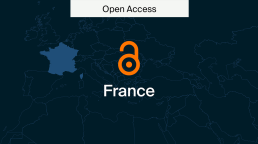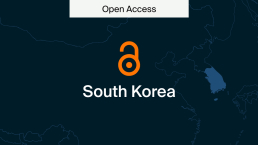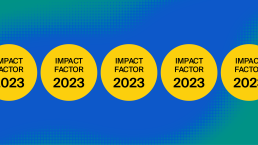
Open Access in France
France was an early leader in Open Access policy. It continues to lead by developing its open science plan and ensuring researchers have the right to publish their work openly. Moreover, France is a key player in the EU’s Plan S initiative, which is accelerating the transition to Open Access.
We outline the history of the French government’s mandates and its current policies for those looking to submit research or read it.
Open Access is the new paradigm
Open Access refers to a publishing model for scholarly research that makes information immediately available to readers at no cost. This research is also free to reuse for scholarly purposes.
The benefits of publishing Open Access include gaining more citations and a greater impact, reaching a wider audience, advancing scientific innovation, retaining copyrights, and increasing the potential for collaboration and recognition. Open Access can also help institutions like universities and research agencies in low- and middle-income countries by removing any price barriers to academic research.
History of Open Access in France
France has gradually increased the requirements for publishing work as Open Access. Here is a brief history of Open Access in France:
- 1999: Revues.org, a portal for online journals in the humanities and social sciences, launched with two Open Access journals.
- 2001: Hyper articles en ligne (HAL), an open archive and infrastructure for authors to deposit scholarly works, was launched.
- 2003: The French National Center for Scientific Research participated in the Berlin Declaration on Open Access to Knowledge in the Sciences and Humanities.
- 2007: The French National Research Agency (ANR) published an OA policy. This strongly encouraged the depositing of funded publications in open archives systems like HAL.
- 2013: French higher education and research institutions signed a partnership agreement favouring open archives, particularly HAL.
- 2016: The Law for a Digital Republic gives researchers the rights to submit their work as Open Access even if they have signed copyright transfer agreements.
- 2018: A group of national research funding organisations, with the support of the European Commission and the European Research Council, launched cOAlition S. This is an initiative to establish full and immediate Open Access to research publications. It is centred around Plan S, the principles behind the initiative.
- 2018: The first National Plan for Open Science was published and the French Open Science Monitor Project was launched. This measures the progress of open science in France.
Open Access has a long history in France, featuring a mixture of community-level projects and national policies and mandates. This is reflected in the statistics too. The proportion of OA publications from scientists based in French labs rose to 67% in 2022.
France is a leader in Open Access policy and a participator in the EU’s Plan S initiative. Let’s delve into the status of and policies for Open Access in France.
Plan S
As part of the EU, France is a member of the international initiative cOAlition S, which is built around Plan S.
Plan S mandates “full and immediate Open Access to peer-reviewed scholarly publications from research funded by public and private grants”. This is supported by ten principles that address copyright, transparency, and criteria, among other things.
Additionally, cOAlition S provides guidance for the implementation of Open Access, news about the movement, and two services for scholars, the Journal Comparison Service and the Journal Checker Tool.
Current Open Access laws in France
In line with Plan S, France’s leading funding agencies, including the ANR and CNSR, require that scholarly publications financed by public funds must be made publicly accessibly and reusable. Specifically, the CSNR set the objective of making 100% of its publications OA. It has achieved 92% as of 2020.
Funding agencies and research bodies support the use of HAL. As of 2024, HAL features over 1.3 million papers and 3.6 million references and is interconnected with other services.
The right to publish openly
The Law for a Digital Republic in 2016 included new provisions and protections regulating the digital economy, data protection, and Internet access. It also featured articles relating specifically to scholarly communication.
Article 30 established the right for researchers to archive an Open Access copy of their work if the work is funded by the State or public, even if the authors signed a copyright transfer agreement. And it establishes that data resulting from public funding must be freely reusable.
Overall, French policies have built a legal framework and infrastructure for researchers to ensure they can pursue open science collectively. This is further supported by the two French Plans for Open Science.
French National Plan for Open Science
The First French Plan for Open Science was published in 2018. It described how:
Open science seeks to create an ecosystem in which scientific research is more cumulative, better supported by data and more transparent with faster and more universal access to results.
The Second Plan expanded upon the First by creating what it calls the ‘paths’ to open science. These paths are requirements and goals for between 2021 and 2024.
The first path explains that Open Access is necessary and should be achieved by publishing the text in an OA journal or placing it in an open public archive such as HAL. This is reflected in the broader aim to achieve 100% OA publication in France by 2030.
The use of the word ‘should’ reflects how this is an ongoing process. OA publication is mandatory for publicly funded work, but not yet for research funded by other means.
Open data was required in the 2016 Law, but the paths describe ensuring that data produced by French public research are structured to conform to FAIR standards, safely preserved, and wherever possible, open to all. The Plan launched the Recherche Data Gouv, which is a federated national research data repository.
This approach to data is also being applied to opening source code too.
Finally, the Plan describes encouraging a cultural shift. This involves transforming practices to make open science the default principle. Practically, this involves developing skills through educational and career pathways and updating research assessments.
The French government tripled the budget for open science through the National Fund for Open Science.
France’s Open Access statistics
France is rapidly moving away from subscription-only to open publication of its scholarly research. Here are some statistics from Scopus:
- 2011: 64% of articles were subscription-only, 16% were green Open Access, and 7% were gold Open Access.
- 2016: 55% of articles were subscription-only, 18% were green Open Access, and 15% were gold Open Access.
- 2021: 29% of articles were subscription-only, 20% were green Open Access, and 31% were gold Open Access.
As you can see, there has been a sharp decrease in subscription-only publication in the last 10 years, with an even growth in both green and gold Open access over the same period. This reflects the flexibility of the government and funding agencies regarding how researchers publish their work openly.
Future trends
Open Access in France will continue to grow. The Second Plan aims to establish 100% OA publication by 2030.
The Plan is funding work to ensure there is a cultural shift to support this transition. This includes updating research evaluation, indicators, metrics, and infrastructures to ensure that publishing open science is beneficial to researchers too.
There will be a Third French Plan for Open Science, as the Second Plan covers 2021‒2024, which will likely be developed in line with updates to the EU’s policy.
Value of Open Access
All articles published by MDPI are made immediately available worldwide under an Open Access license. This means:
- Everyone has free and unlimited access to the full text of all articles published in MDPI journals;
- Everyone is free to re-use the published material if proper accreditation/citation of the original publication is given;
- Open Access publication is supported by the authors’ institutes or research funding agencies by payment of a comparatively low Article Processing Charge (APC) for accepted articles.
Researchers can satisfy France’s developing Open Access policy and pre-empt any stricter legislation by publishing in an MDPI journal. Alternatively, if you want to publish an early version of your article, try Preprints, our service for publishing early versions of research that are not peer-reviewed and report on either ongoing or complete research.
Open Access makes vital information accessible to all readers and researchers and brings together scholars from across the world. Thus, it is ideal for tackling global challenges such as climate change and cancer research that require urgent and coordinated attention.
France is leading Open Access policy and is a key player in the Plan S Initiative. If you want to learn more about Open Access generally, we have several articles that may interest you.










